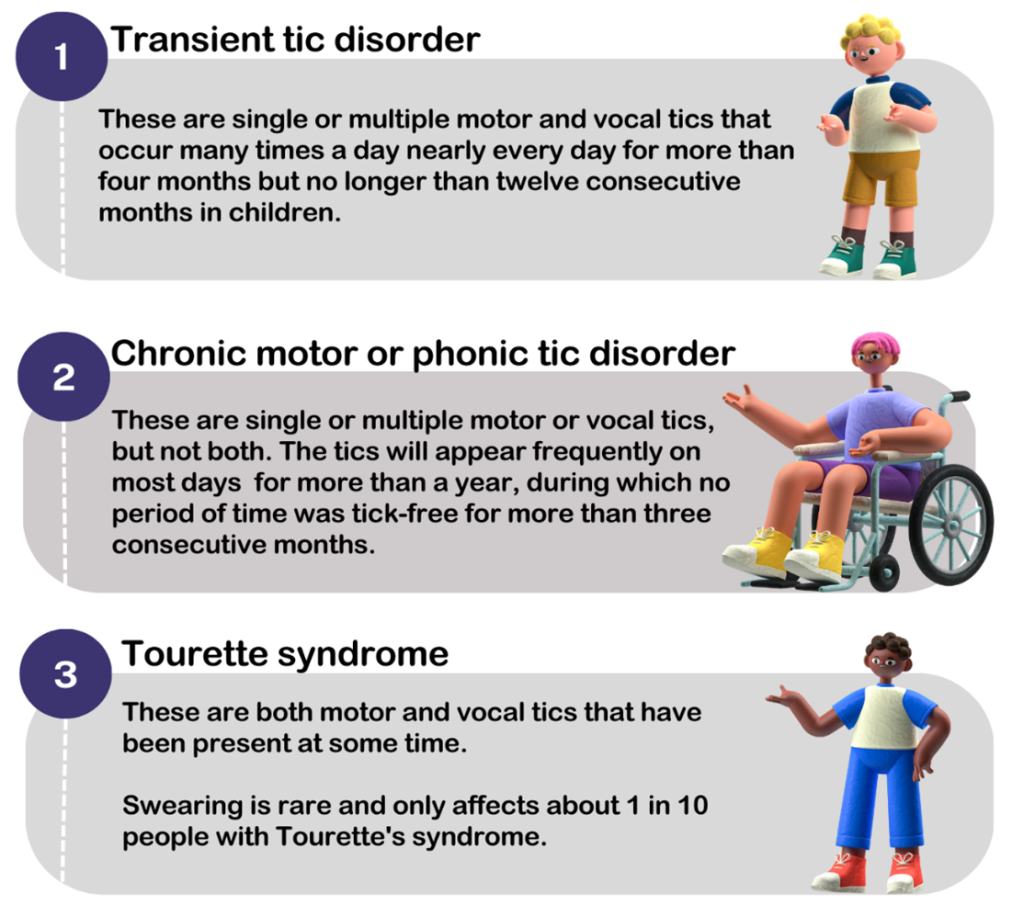Tics: What you need to know

Tics are fast, repetitive muscle movements that result in uncontrollable, sudden body jolts or sounds.
How common are tics?
Tics are common in childhood with at least 5% of children experiencing tics at some point in their lives. It is also three times more common for boys to be affected by tics than girls.
What age do tics usually first appear?
Tics typically first appear at around five years of age but very occasionally they can start in adulthood.
Types of tic disorders
What are the signs and symptoms of tics?
Tics can vary in their presentation and complexity.
Simple tics are abrupt and fragmented. Some physical (motor) examples can include eye blinking, head jerking, shoulder shrugging and facial grimacing.
Examples of sound (phonic) tics can be throat clearing, sniffing, coughing and tongue clicking.
Complex tics usually last longer and physical (motor) examples of these can be jumping, touching other people or things, smelling, twirling and sometimes hitting or biting oneself.
Examples of sound (phonic) tics can be uttering words or phrases out of context, coprolalia (saying socially unacceptable words) and echolalia (repeating a sound word or phrase that has just been heard). If tics are chronic, they are expected to be worse in severity between 10-12 years of age.
Are tics and Tourette’s Syndrome the same thing?
Tics are often misunderstood as Tourette’s Syndrome which is a condition which makes people swear or say socially inappropriate words. Although it is true that coprolalia (the clinical term for involuntary swearing) is a symptom of tics, it only affects minority of people.
We can consider tic disorders as a spectrum to help understand the difference between tics and Tourette’s syndrome.
It is important to know the difference between the tics and Tourette’s syndrome, but please be aware that they can present differently in young people.
What causes tics?
It is unclear what causes tics. Tics are known as a neurodevelopmental condition; this is because tics develop as the brain is still developing. Research suggests that the repetitive movements or sound production is related to an imbalance in the function of brain neurotransmitters.
Much research has also suggested that there is a strong genetic component in many cases and therefore tics can run in families. However, there is not a single gene that causes tics or can be tested to diagnose for tics.
In most cases, tics are temporary and resolve on their own. However, if the tics persist over time, they may become more complex and severe.
What can trigger tics?
Research shows that there are common environmental triggers which can increase tics in frequency and intensity.
It is important to remember every young person is different and there will be triggers which are individual to each person.
-
Stress and anxiety
The most common trigger for tics is stress and anxiety. When a young person is stressed, it can cause muscle tension which can then disrupt nerve energy and body signals.
It is important to not tell a young person off about their tics because they are not voluntary and they are not doing it on purpose. Instead, wherever possible, try and ignore the tics because if attention is drawn to it, it can lead to stress and anxiety and make the tics worse.
You can help a young person by reassuring them that there is nothing wrong with having tics and that there is no reason for them to feel ashamed. This can help to relax the young person which may reduce the tics.
Click here for more information on supporting a child manage their anxiety.
-
Tiredness and lack of sleep
A young person with tics may experience additional sleep problems such as difficulty falling asleep, frequent waking at night, difficulty getting back to sleep and an increase in non-tic movements such as tossing and turning in bed.
Children need more sleep than adults because they are growing and learning at such rapid rates and therefore need additional sleep for optimal development and alertness.
Click here for more information on how to help your child sleep.
-
Boredom
It is also helpful for the young person to keep busy throughout the day as it has been suggested that keeping busy can help to decrease tics (and help them sleep at night).
Tics are often most prominent when watching television, so it is helpful to keep busy by finding an activity that requires concentration. It might be helpful as a family to identify some enjoyable activities to do with your young person.
-
Poor diet and lack of exercise
Although there is no medical evidence to suggest that a particular diet is better suited for people with tics, many young people notice that their tics worsen when they eat food that contains additives and artificial colourings.
A balanced diet, rich in fresh and natural foods, containing plenty of vitamins and minerals, is a great approach in supporting your young person’s general health and well-being. Exercise is also beneficial for all young people.
Click here for more information on why exercise is beneficial for your child.
Please remember that every young person is different and there will be additional triggers that are individual to each person.
It is helpful to have conversations with your child and observe changes in their behaviour to help identify individual triggers and how to work together to manage these.
Talking to people about tics
Being open and sharing your experience with tics may help other parents who are going through the same thing.
Having a tic disorder can feel complicated for many children and their families. It can be hard to explain to others what your child is experiencing.
Having a Tic or Tourette Syndrome Passport for your child can be helpful in many situations where other people would benefit from understanding what it is your child is experiencing and why they may be feeling or behaving in a certain way.
Click here if you would like to download your own Tic Passport.
Click here if you would like to download your own Tourette Syndrome Passport.
Do I need to take my child to see their GP?
You do not need to take your child to the GP if their tics are mild and not causing difficulties to your child’s day to day life.
Click here for more information on when to visit your GP.


